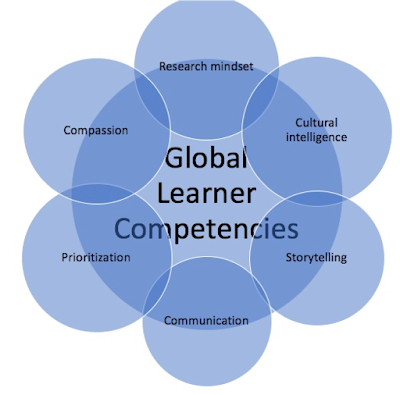On International Student Competencies
International education is growing, in spite of all the barriers various nations put up to stem the flow. I have written earlier about the limitations of how the universities treat international students. There is also much to be said about how success should be defined in International Education and how best to measure and balance the benefits of the host society and the nations where the students come from. However, a critical part of this discussion is also to identify who is ready for international education, which builds the foundation of successful engagement and meaningful outcomes even if the universities are prepared to meet the students half-way.
For this, the current practice of defining the international student 'competencies' just in terms of how much money s/he has in the bank and how well s/he speaks the language of the host society (when the immigration authorities demand so) is plainly inadequate. The money part is usually treated as a proxy for social capital, which is often not correct for the students from fast-growing countries, besides being completely contrary to the implicit social mobility promise of higher education. The language part also tells little, as this is measured in a fairly limited way in a narrow context; it often reflects the learner's ability to throw money on preparatory classes.
As I look to device a new plan to develop an international education proposition, I have been revisiting some work that I did a few years ago as a graduate student, interviewing a few hundred students and educators from half a dozen countries to figure out what may help one succeed in international education. I am indeed quite aware that the scope of this research was somewhat inadequate: Carried out for a graduate paper within a limited time, I focused on only one type of course, Accounting, and measured student success in terms of examination outcomes. Indeed, more work is needed to establish what really makes one successful in a broader sense and if there are differences between disciplines. However, my key point holds: More thinking is needed about 'global learner competencies' and practicable frameworks to develop them.
With that disclaimer out of the way, here is a quick view of the framework I developed, which I intend to work upon as I build a new international education proposition in the UK.
The six factors, as above, that came on top were comprised of two directly related to the students' academic work (Research Mindset and Storytelling), two that helped them to operate effectively within a largely unfamiliar environment (Cultural Intelligence and Communication) and deal with pressures and emotional aspects of being a student (Prioritization and Compassion). I recognise some of these are self-explanatory, like communication and prioritization, and this blog post is hardly sufficient to dive deep into all the data and explanations. But it is worth, for the completeness of discussion, trying to answer two questions I often get.
The first is if the storytelling and communication are different skillsets. This is an issue of definition: I defined storytelling as an ability to arrange facts and opinions in an order that captures attention but did not want to limit this to 'presentation', as the latter term is understood to be a way of delivering Powerpoint slides. Communication was indeed broader and was about receiving information as much as delivering them and involved linguistic skills, including accent and ability to write within the host country convention.
The second is the somewhat unexpected inclusion of Compassion. I found that this was key to the emotional well-being of the international students within their somewhat isolated lives in a new country. It was in this mental health, rather than moralistic, sense I used the word. However, I refrained from 'resilience' because this was more than just coping and surviving; a successful international student, as I saw and understood it, made friends and felt a deep affinity with them, without necessarily thinking of interests and outcomes. In fact, resilience or grit was the outcome. The other word I could use for what I meant here is 'empathy' but it's a somewhat ugly word for a feeling and not action: Compassion, for me, was the key ability to make friends, stand by them through the trials and tribulations and build long-term emotional connections that made international studentships rewarding.
As I look to build models of online delivery, my aim now is to think about the personas of students: Thinking about these key competencies of international students is important to me as I expect, over time, most of the students we serve would come from International markets. My work now is two-fold: One to further develop this model (and particularly explore disciplinary variations within it) and the other is to look for practical ways of measure and develop these competencies.


Comments